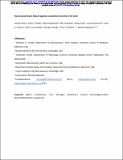The neuronal pentraxin Nptx2 regulates complement activity and restrains microglia-mediated synapse loss in neurodegeneration
Author(s)
Zhou, Jiechao; Wade, Sarah D; Graykowski, David; Xiao, Mei-Fang; Zhao, Binhui; Giannini, Lucia AA; Hanson, Jesse E; van Swieten, John C; Sheng, Morgan; Worley, Paul F; Dejanovic, Borislav; ... Show more Show less
DownloadSubmitted version (7.751Mb)
Open Access Policy
Open Access Policy
Creative Commons Attribution-Noncommercial-Share Alike
Terms of use
Metadata
Show full item recordAbstract
<jats:p>Complement overactivation mediates microglial synapse elimination in neurological diseases such as Alzheimer’s disease (AD) and frontotemporal dementia (FTD), but how complement activity is regulated in the brain remains largely unknown. We identified that the secreted neuronal pentraxin Nptx2 binds complement C1q and thereby regulates its activity in the brain. Nptx2-deficient mice show increased complement activity, C1q-dependent microglial synapse engulfment, and loss of excitatory synapses. In a neuroinflammation culture model and in aged TauP301S mice, adeno-associated virus (AAV)–mediated neuronal overexpression of Nptx2 was sufficient to restrain complement activity and ameliorate microglia-mediated synapse loss. Analysis of human cerebrospinal fluid (CSF) samples from a genetic FTD cohort revealed reduced concentrations of Nptx2 and Nptx2-C1q protein complexes in symptomatic patients, which correlated with elevated C1q and activated C3. Together, these results show that Nptx2 regulates complement activity and microglial synapse elimination in the brain and that diminished Nptx2 concentrations might exacerbate complement-mediated neurodegeneration in patients with FTD.</jats:p>
Date issued
2023-03-29Department
Massachusetts Institute of Technology. Department of Brain and Cognitive SciencesJournal
Science Translational Medicine
Publisher
American Association for the Advancement of Science (AAAS)
Citation
Zhou, Jiechao, Wade, Sarah D, Graykowski, David, Xiao, Mei-Fang, Zhao, Binhui et al. 2023. "The neuronal pentraxin Nptx2 regulates complement activity and restrains microglia-mediated synapse loss in neurodegeneration." Science Translational Medicine, 15 (689).
Version: Original manuscript